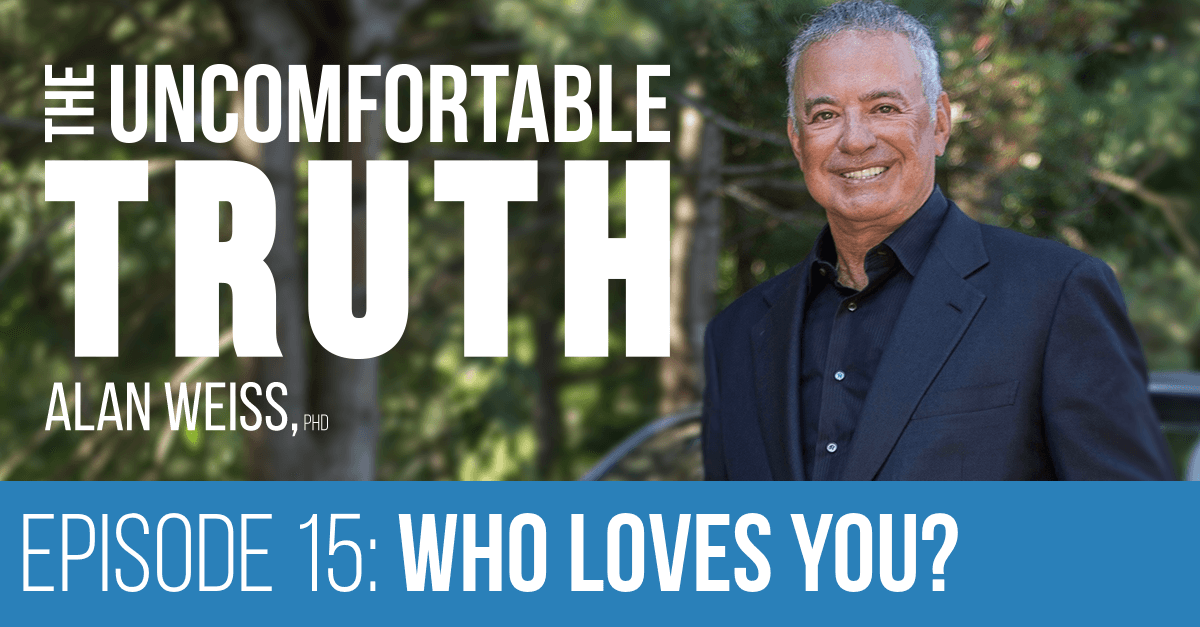
Episode 15: Who Loves You?
“Why all of us require unconditional support at times and why it's so difficult to obtain it.”
Transcript:
Welcome to The Uncomfortable Truth. This podcast is called, Who Loves You? That's right, who loves you?
There's a great Four Seasons song, 1975. I used to see them at Rutgers. They cost us $2,500 in 1967. They've gone onto more than that. The Jersey Boys.
But, who loves you? That is I'm asking you, on whom can you rely? Not as many people as you think. That's the uncomfortable truth.
I know a guy who has a dire illness, a great guy. And during this dire illness, his wife left him. She has all kinds of excuses, none are good enough for me. She left him.
You know people make mistakes, but when they make mistakes they often become pariahs. We never forgive. So the pariah is surrounded by piranhas. Snapping at the flesh. Maybe I overdramatize, but I don't think so. We need to know who loves us.
You know a manager at Merck told me once, that one of his people had made a million dollar error. Merck is, I don't know, a $400 billion company at the time, whatever. But a million dollar error is not chopped liver. And I said, “Was there pressure to fire him?” He said, “No, on the contrary. Somebody makes a million dollar error, they learn that kind of lesson, they're too expensive to fire.”
That's the kind of attitude I like. The guy didn't do anything with personal malice or for personal advancement. He made a mistake. We all make mistakes. They don't cost us a million dollars usually.
Sinatra sang of loneliness. He sang of wondering who loves him. He sang songs like Don't Worry About Me. If you can get along, don't worry about me. On the Isle of Capri, Down Mexico Way, This Nearly Was Mine. They're about loneliness basically. And of course the great love of his life, Ava Gardner, he lost.
So we fear being alone. We fear being ostracized. We fear being ignored. We fear being irrelevant. And what do we do about that?
Well when you've really blown it, when you've really blown it, and all of us have. I know I have. How many people remain truly supportive, aside from your dog? My wife always has. I mean she's given me a tough time. She's read me the riot act on occasion, appropriately so. But she has stood by my side.
But I know spouses who aren't supportive when their husband or wife makes a business decision that isn't successful. I know spouses who say, “This will never work for you. Why don't you get a real job?” I know spouses who say, “How could you have made such a stupid mistake?” Some of them stop talking. Some of them act like they're the chair of the board. You know, bringing down the hammer. If your spouse isn't supportive, if that's not who loves you, then who does?
Take a look on Facebook, you know that great wasteland of needy. People actually put up posts asking others to prove that they've read their post. That's how needy they are. To prove that they've read their post. And the problem of course, is that they're basically lonely. And that's why they're asking.
You know my feeling is, I just had a convention about a week ago from this recording, and there were 125 people there. And my feeling is, if five people were helped, that's great. Now more than that were, but if you can help some people, fine. It's not about perfection. It's not about everyone.
On Facebook, you collect “likes.” Please like me. I need to know that you love me. And there's this craving for virtual friends. But on Facebook we're not really talking about friends, we're talking about collectibles, aren't we? We're talking about counting the numbers.
So a question I have for you. When we talk about who really loves you, is do you reciprocate? Are you providing that kind of support for someone important? Your family, your friends, your colleagues and your businesses. Do you say to someone, “Okay, you blew it. Where do we go from here?”
Being at the center of this global community I have, I hear about some execrable business decisions. Some terrible financial losses. Some divorces. Some terrible arguments. Some serious illnesses. Some tragedy. But this too shall pass. And if you're supportive, you can help people through it. But you've got to be there for them, just as you'd like them to be there for you. That's the reciprocation. But if you're not doing it, why would you expect others to? If you're not giving, how can you just take?
You want to say to someone, “Alright, you blew it.” We've established that. Now how do you atone? What would be required of you to atone? What actions, what behaviors would constitute trying to make this right? Not perfect, not forgotten, but better. And then, are you willing to atone? If this is what's required, how willing are you to do it?
And if they are willing to atone, and they know what needs to be done, and they admit that they blew it, then you ask, “How can I support you? How can I best help you?” And we see this a lot, people aren't recognizing it as such, but they do it. But my point is, you can't expect it, if you're not doing it for others.
My uncomfortable truth for you today includes this. Family is your true and closest support, period. That's it, period. And so if it's not there, you've got a deficit to correct. Now sometimes it's not there because you don't have family. They've passed away or you're an orphan, or for some reason you're not close, or geographically they're far, distant. But some people don't have family, and I understand that of course.
But sometimes it's because the family is right there, but we're not vulnerable. We don't let them in. We don't share things. They aren't even aware of what's going on. And sometimes it's because we hold eternal grudges. And so at the holidays, we're used to people who show up, and they get drunk and we argue, and they go home until the next time we see them.
But there is closer family with whom we can't afford to have those kinds of arrangements. Yet, I know a lot of families who don't even have dinner together at night. Or if they do, don't talk to each other. You've seen the people in restaurants, each working their cellphones. That's too bad because that's not going to help the loneliness.
After family, tight friends are next. They're close friends. They're people who know you well. They're people who can be honest with you. And tight friends, close friends, they forgive and they help you to atone. That's what I was eluding to earlier. That's what they do.
A common cause would be the third grouping here. And by a common cause, I mean look at how Alcoholics Anonymous works with sponsors. With people standing up at meetings and helping each other and admitting their problem. The same thing with drug addiction programs.
And then a fourth is spirituality and religion. Not everyone has religion, not everyone has spirituality, but some do. And the heart of the Judaism-Christian ethic, especially Christianity, is tolerance and forgiveness. And when you have tolerance and forgiveness for others, you might rightfully expect it for yourself. And that means that no matter how much you've blown it, you won't be alone because people will rally and help you.
So it's family, it's tight friends, it's common cause, and it's spirituality and religion that can help you feel less lonely and feel included.
So who loves you, baby? I mean that's the real question here. We all need real friends. Not Facebook friends, not virtual friends. We need real friends. If you find you don't have them, develop them. It's never too late and it's tough to go through life alone. And you're alone if you don't have truly close friends. That's the way it is.
We all require unconditional support at times. We require, just as unconditional love is important, unconditional support. That's support that's not qualified. That's support that's not, well what if. That's support that's not, well maybe. Unqualified support, even when we're wrong.
People in prison hopefully are there to some extent to be rehabilitated. They're visited by family and friends. People who've committed crimes. We all need unconditional support. We all deserve it as human beings.
But not many people can do that. It's easier to flee. It's easier to run from the sinking ship, jump overboard. Swim away. We see that all too often. And so we need to think about this unconditional aspect in the giving and receiving.
Staying around in good times is easy. Man, when things are going well and money is flowing in, you look around and you're surrounded by people. They just want to be a part of that. But people tend to flee in bad times. People tend to run, and that's not who loves you, baby.
You know unfortunately, dogs can't talk. They can give unconditional love, but it's hard to give unconditional support when you can't talk. There's a line, you know, in the Four Seasons song, Who Loves You Baby? And the line is this question, who's going to help you make it through the night?
Think about that. It might be worth finding them. And that's the uncomfortable truth.






